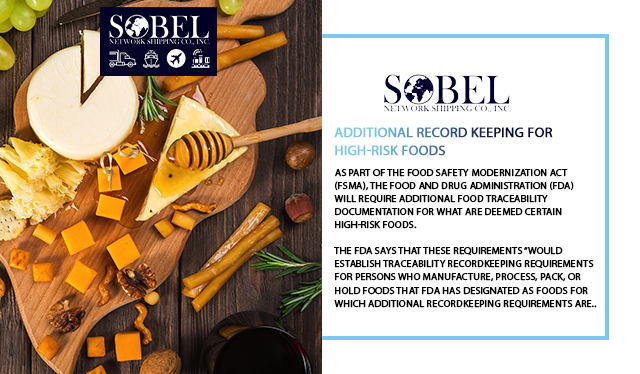As part of the Food Safety Modernization Act (FSMA), the Food and Drug Administration (FDA) will require additional food traceability documentation for what are deemed certain high-risk foods.
The FDA says that these requirements “would establish traceability recordkeeping requirements for persons who manufacture, process, pack, or hold foods that FDA has designated as foods for which additional recordkeeping requirements are appropriate and necessary to protect the public health. The requirements are intended to help us rapidly and effectively identify recipients of these foods to prevent or mitigate a foodborne illness outbreak and to address credible threats of serious adverse health consequences or death as a result of such foods being adulterated … or misbranded.”
The new requirements seek to establish records of key data for every step in the supply chain. While importers who “hold” foods aren’t specifically addressed, it’s best to be compliant as the FDA could refuse your goods entry if these documentation requirements aren’t appropriately met.
The list of foods considered high-risk are as follows from www.FDA.gov :
Cheeses, other than hard cheeses — Includes all soft ripened or semi-soft cheeses, and fresh soft cheeses that are made with pasteurized or unpasteurized milk
Shell eggs — Shell egg means the egg of the domesticated chicken
Nut butter — Includes all types of tree nut and peanut butters; does not include soy or seed butters
Cucumbers — Includes all varieties of cucumbers
Herbs (fresh) — Includes all types of herbs, such as parsley, cilantro, basil
Leafy greens, including fresh-cut leafy greens — Includes all types of leafy greens, such as lettuce, (e.g., iceberg, leaf and Romaine lettuces), kale, chicory, watercress, chard, arugula, spinach, pak choi, sorrel, collards, and endive
Melons — Includes all types of melons, such as cantaloupe, honeydew, and watermelon
Peppers — Includes all varieties of peppers
Sprouts — Includes all varieties of sprouts
Tomatoes — Includes all varieties of tomatoes
Tropical tree fruits — Includes all types of tropical tree fruit, such as mango, papaya, mamey, guava, lychee, jackfruit, and starfruit
Fruits and Vegetables (fresh-cut) — Includes all types of fresh-cut fruits and vegetables
Finfish, including smoked finfish — Includes all finfish species, such as cod, haddock, Alaska pollack, tuna, mahi mahi, mackerel, grouper, barracuda, and salmon; except does not include siluriformes fish, such as catfish
Crustaceans — Includes all crustacean species, such as shrimp, crab, lobster, and crayfish
Mollusks, bivalves — Includes all species of bivalve mollusks, such as oysters, clams, and mussels; does not include scallop adductor muscle
Ready-to-eat deli salads — Includes all types of ready-to-eat deli salads, such as egg salad, potato salad, pasta salad, and seafood salad; does not include meat salads
To learn more about these requirements, and how they impact your logistics strategies, reach out to your Sobel representative today and let our in-house licensed Customs brokers do the heavy lifting to keep your goods compliant and you moving forward to meet your service promises.


